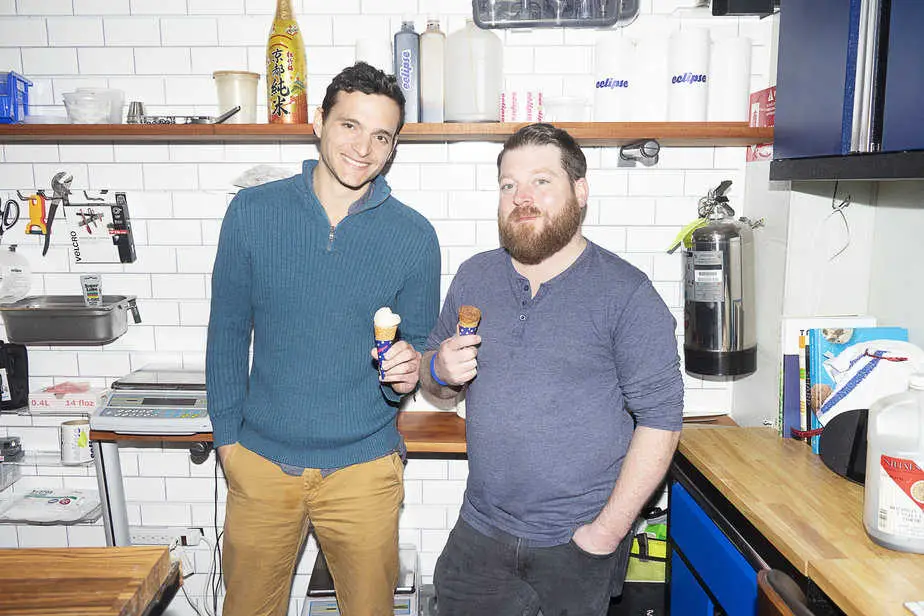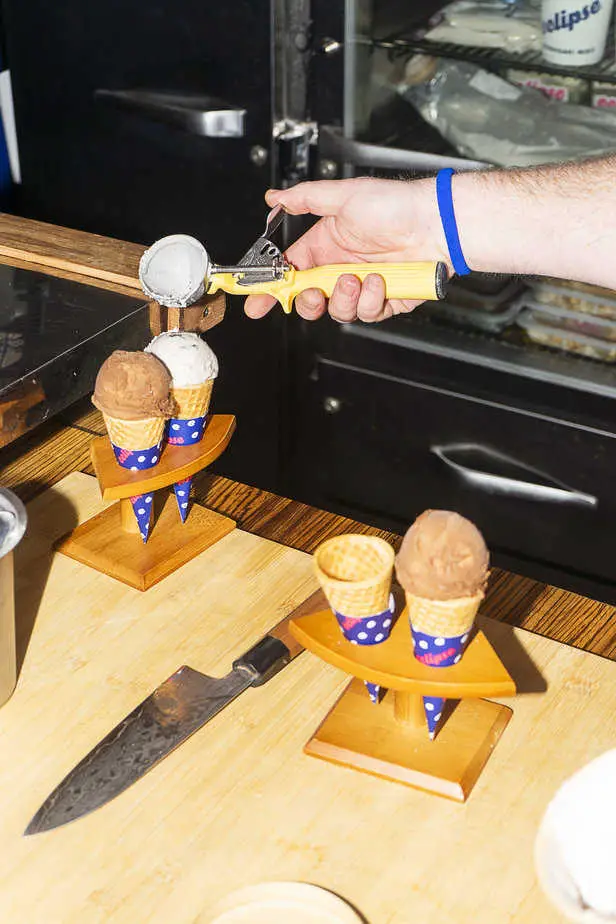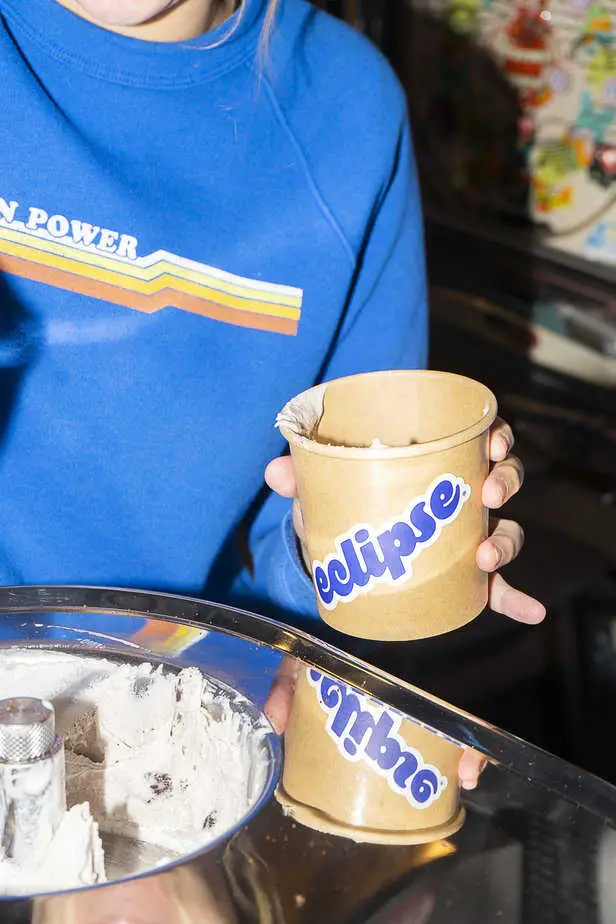As we’ve reported—California is shifting away from whole dairy as whole in the past decade and they’re shifting fast. Those found being born in the 90’s and today are striving for alternatives in all sense of the word. In a world where 2% of milks are being substituted for hemp milk, our brains can’t even wrack around the other 100’s of alternatives being brought to the market. And if you think Bob Cut is becoming a dairy reporter, you may be right. But we’ve been keen to try new, as an office full of lactose intolerant men and women, dairy substitutes are at the top of our tongues the minute we walk into a tastefully decorated cafe. But what do we miss more than just smooth creaminess of milk, maybe all the the dairy byproduct we now have to whisper sorrow goodbyes to. No to cheeses, no to heavy creams, even no to ice cream.
But like a lightbulb going off, we thought “maybe we don’t need to give up our wants for dairy.” California, especially San Francisco Silicon Valley, have long been bastions of technological feats boasting how to optimize X for Y or Y for Z. Thus the products of Impossible and their world-renowned, “Impossible Burger” have swept vegetarians and vegans alike—giving meat like quality and texture without any sort of meat byproduct. In a dairy world, we’re seeing the Eclipse. What seemingly was a came-out-of-nowhere brand has hacked the amino chain in dairy and completely replaced any sort of lactol compound with plants. Yes, you read that correctly.
Picture this: a delicious silky scoop of cookies and cream ice cream. It tastes creamy and smooth to the tongue, it holds it shape: not too loose and doesn’t melt into a puddle. Now visualize it being made from 100% plants. For co-founders Aylon Steinhart and Thomas Bowman, reimagining a world where we better utilize food and the consequential waste of food gets the two overwhelmed with determination. Just shy of one year, the two have taken the idea of plant protein into full throttle dairy heaven.
“Eclipse, we make plant based dairy products that are indistinguishable from their animal counterparts,” Steinhart tells me as we stand in their Berkeley, California 300-square-foot test kitchen with Bowman whipping up a fresh batch of cookies and cream ice cream to taste. The two are unprepossessing and don’t ooze the founder’s pizazz we’re accustomed to meeting in a Silicon Valley sense—in fact, it feels like a normal conversation between confidants. “So the way we’re able to do that is we’ve created a milk that functions like conventional dairy milk. In the same way that you would use a cow’s milk to create a cheese or an ice cream, or sour cream, you can use our milk to create those products using that same process. And the end result is a product like cheese or ice cream that has the taste, texture and functionality of conventional dairy.”
But I’m no scientist, I have a small to little understanding of what that means. In my head, dairy is dairy because it comes from a cow? But standing in between these two, my little knowledge of the topic becomes even smaller. “I’ve been in the food world my entire working career since about 15 years old,” Bowman tells me, “I worked in a total of 16 Michelin stars [restaurants] around the globe. I was also honored as a James Beard rising star chef and then featured in Forbes 30 under 30. Prior to founding Eclipse, I was the director of product development at the Hampton Creek, now Just Foods. But I created some of the best selling plant based products on the market today.” I’m stunned.
Steinhart also jumps in with his credentials, “Before starting Eclipse, I was at the Good Food Institute. It’s the leading nonprofit in the alternative protein space. I came in there to help start their innovation department, which essentially meant two things. One was running an incubator for the plant based world, so helping other plant based startups get funded. Two: build their strategic plan. And then the other thing was evangelizing the space because this market is so, so huge.”
But how huge is dairy and subsequently the alternative protein sector? Something I’m not thinking about as I’m telling the barista near my apartment what version of Oatmilk I’m craving that morning. From 2012 to 2016, whole milk sales are up nearly 1 billion pounds per year, or approximately 7 percent, and flavored whole milk sales are up 93 million pounds, or 18 percent. Annual conventional milk sales declined by more than 4 billion pounds, or approximately 8 percent. Organic [and non-traditional] sales captured some of this market, increasing by 20 percent, or 425 million pounds. To put into perspective: the National Academy of Sciences estimated that 14 billion pounds of garbage was being dumped into the ocean every year. That’s roughly 10% of the ocean. So put trash data in perspective with pounds of milk, that’s a lot of cows getting milked. Nuts (milk), right?
“Eclipse is a mission driven company,” Steinhart adds, “we are here to create a more sustainable, healthy and humane food system.” But by looking at the two, you wouldn’t guess that they would be the perfect pair for the job. One has an Off-The-Google-Bus demeanor while the other in food safe clog-like sandals. But a few minutes together in the same room, the pair instantly knew the missions they both had been championing for years—Bowman recants the story of their paths “[Steinhart] and I were on similar speaking circuits and I came in for a tour of the world premier of Just Egg. Aylon was there speaking to reporters and people coming in for a tasting and lead the charge of the importance of these alternative proteins and what they can do. He and I started talking and really got matchmade, through one of our mutual friends, the founder of Mission Barns. And he was really pushing us together. When we finally, you know, both had a few free minutes to get together, we kind of knew right away. Yeah, let’s do this.”
Steinhart smiling while nodding in agreement, “for me it was kind of how and when. So when I had the opportunity to meet with Thomas, it was like a no brainer that this would be the perfect partnership to make that happen.”
But the challenge is faced in front of them—how does one (or two) go about changing the world, especially in an alternative protein space. One of the major factors inspiring the growth of the global alternative protein market is acceleration in the investment, as the investors are always on the lookout for the emerging ideas with the potential to disrupt the status quo and bring big returns; the alternative proteins are poised to do just that. Currently, the market base for alternative protein is approximately $2.2 billion compared with a global meat market of approximately $1.7 trillion, making the growth rate of the alternative proteins marginal to the overall meat market.
“There’s been major learnings and things we knew could possibly happen and are happening,” says Bowman about being a startup in the alternative food space, “and really what defines a startup isn’t what they do, but how they act when these hard times come up. So it’s really on us to just move quickly to adjust, to fix, to make it better. While also not being afraid to make mistakes and not be afraid to fall on our faces. You know, Thomas Edison said it best, ‘I can show you five hundred ways how not to make a filament for a light bulb.’”
Steinhart credits his learnings to those around him—it takes a village to do what the duo set forth to create one year ago, “where we’ve had a lot of luck with is growing the team and bringing on the right people. I actually get tingles from it because the people that are working are so good and so driven. I think what I’ve learned after a year is like really stress the process of bringing in people and make sure that those people are great.”
Though the market is beginning to see the introduction of alternative food in the foodsphere, in the past five years—could Eclipse have essentially eclipsed themselves in the process? For the duo, it’s a one step at a time process and their glorious step is their game-changing ice cream. “The product that we have in the market today with the ice cream,” Steinhart begins, “so really when we look out at the alternative protein market today, you see like McDonald’s testing out Beyond Meat in Canada, Burger King has launched the Impossible Whopper all over the United States. The biggest names in food are starting to integrate alternative proteins. We think that if those products, those meat products exist in these companies, then a dairy alternative should definitely exist. And we think that Eclipse is going to be that dairy alternative.” The ice cream contains canola oil, for example, since the frozen nature of the product means you can get away without needing a saturated fat. Eclipse is made from ingredients like potato, corn, cassava, canola oil and cane sugar.
What struck me in this conversation however is that Eclipse as a product is safe, in perspective. Eclipse is free “from all common allergens,” Steinhart interjects as I ask about the actual makeup of the dairy. “So it’s something that the massive mainstream consumer base can actually consume. Because we don’t use nuts, seeds or coconut, our product is inherently cheaper to produce, which means we can go head to head with dairy and actually get to those dairy commodity prices, which from a mission impact perspective and from a business perspective is just a mind blowing thing.”
Though who’s the market for plant protein? Thanks to social media, globalization and the increased popularity of flexitarian, vegan and vegetarian diets, a third of Americans last year said they wanted to “reduce their meat consumption and increase consumption of plant protein,” Lisa Feria, the CEO of animal welfare-focused venture capital firm Stray Dog Capital, said at a panel at South by Southwest in March of 2019.
Most of this dietary evolution, she pointed out, is happening in younger generations. Feria said millennials are 12 times more likely than baby boomers to eat a plant-based diet. Though if you’ve been living under a rock, the success stories of Beyond Burger and Impossible Burger are ideal case studies for the potential growth of plant-based alternative proteins. When Impossible Burger appeared in 2016 and replicated the iron molecule heme in a lab, it was a quantum leap forward for the alternative-proteins space. Since then, the popularity of meat-like burgers made from plants has continued to grow.
“As a country, we’ve never experimented beyond the core food pyramid, we’re a little behind in (eating insects),” Phil Kafarakis, the president of the Specialty Food Association, told Food Dive.
Still, he noted that even if insect protein companies are having to battle traditional American food preferences, the insect industry cannot be ignored. Global Marketing Insights reported that from 2018 to 2024, the edible insect market will increase 43.5% to nearly $80 million in the U.S.
“As far as we’re concerned, they’re for real,” Kafarakis said.
So is the world ready? Steinhart states it perfectly, “anywhere that there is dairy, we see an opportunity for Eclipse to be there and provide consumers with a product that has the taste, the functionality, the texture they love. But without any of that baggage like health restrictions to climate change, to animal suffering, to all these things that people don’t want. So let’s just help them eat in line with their values.”
Excitingly, Eclipse has made its way into more retail outlets in the Bay Area simultaneously at Mitchell’s Ice Cream in San Francisco and Milkbomb in Berkeley. Mitchell’s and Milkbomb are each serving two flavors of Eclipse ice cream: Milkbomb offering Vanilla and Chocolate, and Mitchell’s offering Espresso and Vanilla Bean-Oreo. These new partnerships expand Eclipse’s Bay Area presence following their debut in the market late last year with Humphry Slocombe. Humphry Slocombe known for pushing the ice cream envelope—let’s just say that the stars have aligned.
// You can find Eclipse with their location tracker here. Photography by Anthony Rogers. Have a tip for us? Submit your ideas directly to us.


